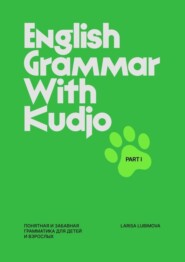По всем вопросам обращайтесь на: info@litportal.ru
(©) 2003-2025.
✖
English Grammar with Kudjo. Part 4. Понятная и забавная грамматика для детей и взрослых
Настройки чтения
Размер шрифта
Высота строк
Поля
Colour (red, dark-blue, turquoise)
Origin /Nationality (Japanese, Russian, English)
Material (stone, fur, paper)
Purpose/Type (hiking, writing, summer)
It’s rare to use more than 3 adjectives. But the adjectives you do use should follow this order, at least, approximately.
When there are two or more colour adjectives, use and: yellow and orange fur.
We usually don’t use and with other adjectives if they are before a noun: a huge brown lynx
However, we can use and with other adjectives if they are after the noun: The lynx was huge and brown.
When there are two or more adjectives of the same category, the more general adjective goes before the more specific one: a nice friendly lynx
EXERCISE 2
Put the adjectives in the correct order (use commas or and if necessary):
1 Luna has a /denim/ big/ shabby/ old/backpack.
2 The lynx’s tail is /strong/ beautiful/.
3 They looked into the /trap/ deep/ scary/ hole.
4 The dogs found a /leather/ red/ stylish/ brick/ collar and immediately recognised it.
5 There was /plastic/ square/ lunch/ one/ old/ box with a /beef/ tiny/ sausage in it.
6 The lynx led them to a /enormous/ frightening/ cold/ cave covered with /mossy/ big/ brown/ old/ green/ branches.
7 The night was so /hot/ humid/ that the dogs were happy to relax in the coolness of the cave.
8 They were /sleepy/ exhausted/ depressed/.
9 Kit saw /white/ several/ big/ clean/ bones and shrank back from the sight of them.
EXERCISE 3
Describe the following using at least 3 adjectives in the correct order:
1 your favourite bag
2 an item of the clothes you are wearing now
3 your phone
4 your bedroom
5 your pen
6 your today’s breakfast
7 your town
8 your favourite cup
9 Kit
COMPOUND ADJECTIVES
Some adjectives have more than one word. For example: a blue-eyed lynx
They are called compound adjectives. Compound adjectives often include participles: a smart-looking dog, a much-hated scientist.
When they are before a noun, we use a hyphen – but when they are after a noun and the verb «to be» or another linking verb, we do not:
Akita-Inu is a long-legged dog. Akita-Inu is long legged.
The exception is with adverbs ending in —LY. These do not require a hyphen: This evil scientist is widely known all over the forest.
There is an additional detail with compound adjectives involving numbers – when they are before the noun, we do not include —s:
The lynx has a ten-month-old kitten. Her kitten is ten months old.
EXERCISE 4
Make compound adjectives to describe the following:
For example,
a dog who loves having fun – a fun-loving dog
1 a pit which is monitored closely —
2 a trip of two days —
3 a knife that cuts sharply —
4 a cave that has dim lights —
5 an adventure that never ends —
6 bones as white as snow —
7 a lynx with a kind heart —








